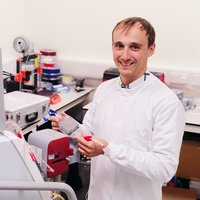Microbes are everywhere. They may be in the air,
soil, water, everything you touch, and even in your body and organs.
Chengcheng Jin,
Assistant Professor from the Perelman School of Medicine at the University of
Pennsylvania, is working on uncovering the hidden interactions between the
immune system, microbio, and tumors. Her outstanding research work has
led to a number of discoveries with innovative concepts and significant
implications in major human diseases.
As a graduate student at Yale University, she uncovered the
critical roles of innate immune receptor mediated inflammasome pathways in
diverse disease conditions. For example, her work demonstrated that the AIM2
inflammasome senses double-strand damage of genomic DNA to mediate
radiation-induced intestinal and hematopoietic injury. The NLRP3 inflammasome
is activated by ectopic deposition of hydroxyapatite crystals in joints to
promote inflammation and tissue destruction in osteoarthritis. Moreover, she found the important role of the NLRP6 inflammasome in maintaining intestinal microbiota
homeostasis to regulate the development of obesity and metabolic syndrome, as
well as colorectal cancer.
Later, she did her postdoctoral research with
Dr. Tyler Jacks at MIT. During this time, she interrogated immune-microbiota
interaction in lung cancer, which is the leading cause of cancer-related
morbidity and mortality worldwide in both men and women.
Chengcheng found that lung
tumor growth is associated with increased bacterial load and altered bacterial
composition in the airway. This local dysbiosis significantly promoted lung
adenocarcinoma initiation and progression. Mechanistically, commensal bacteria
stimulated the proliferation and activation of lung-resident γδ T cells to
promote inflammation and tumor cell proliferation. Eliminating commensal
bacteria by antibiotic treatment, blocking γδ T cells or their downstream
effector molecules such as IL-17 and IL22 all significantly suppressed lung
cancer.
This study provided the first evidence clearly linking
microbiota-immune crosstalk and lung tumorigenesis, thereby defining key
cellular and molecular mediators that may serve as effective targets in lung
cancer treatment and prevention.
Now Chengcheng is establishing her own lab at the University of Pennsylvania and aiming to further figure
out the interplay between the immune system, cancer, and microbiome.




